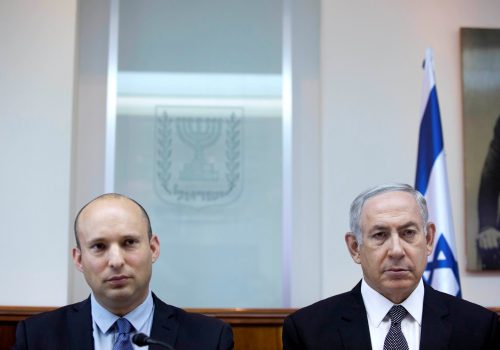The Israeli government collapse was a curveball for Biden’s upcoming visit. But it shows the depth of the US-Israel relationship.
White House officials planning international presidential travel do their best to eliminate uncertainty. Such trips are planned with down-to-the-minute precision, which starts when Air Force One rolls to a stop at a piece of tape placed on the host country’s airport tarmac. But surprises lurk around every corner, with advance staffers poised to jump into action at a moment’s notice and smother them.
Nevertheless, travel to Israel can produce surprise even before the plane touches down. In Israel’s raucous parliamentary democracy, coalitions often teeter perpetually on the edge of viability, and small parties can bolt and bring down governments overnight. Terrorist attacks—stabbings, bus bombings, and rockets—might puncture a quiet stretch of time; full-blown conflict between Israel and Hamas in the Gaza Strip has erupted four times in thirteen years; and West Bank settlement approvals can be announced with little notice. As a result, planners of these visits know they must remain on their toes.
President Joe Biden’s team was thrown such a curveball on June 20, as the year-old coalition built by Prime Minister Naftali Bennett and Foreign Minister Yair Lapid finally gave way to internal pressures. An election—Israel’s fifth in under four years—will take place this fall, with Lapid serving as caretaker prime minister until a new government is formed.
But the White House was ready and they have responded well, confirming that the July 13 visit will go forward as planned. In one sense, they had fully anticipated this possibility. The Bennett-Lapid government was an incongruous collection of eight parties spanning numerous divides of ideology and identity, with not a single vote to spare. Its collapse had been predicted since the day it was sworn in, and the fact that it lasted a year, passed a budget, and governed well only means that it exceeded expectations. But, with Biden having pledged many months ago to visit Israel this year —the perfectly natural thing to do for a politician possessing decades of intimate engagement with and deep support for the US-Israel relationship—this possibility was certainly factored in.
For Biden, there are two issues he must manage in response to the pending change of government: who will he engage with during the visit and how will it affect his agenda?
With Bennett relinquishing the prime ministership, his partner, Lapid, will now play host to Biden. There are some decisions that an acting prime minister isn’t able to make, but he is fully empowered to represent the country in diplomatic protocols. Bennett and Biden had established a high-quality rapport during meetings and calls over the past year, as both worked to distance themselves from the tensions of the Benjamin Netanyahu-Barack Obama years, dealing with disagreements respectfully and, as much as possible, privately. But Biden knows Lapid as well, and, if anything, the two of them have more in common, as Lapid expresses support for a two-state solution with the Palestinians, which Bennett opposes.
However, with an election campaign underway, Biden will also take care to eschew any sign of US intervention in Israeli politics. That calls for a meeting with the leader of the opposition, former Prime Minister Benjamin Netanyahu. A short, respectful, keep-in-touch visit with opposition leaders is standard in visits between leaders of democracies. Biden has known Netanyahu for some forty years and they have a history of friendship, even amidst strains and disagreements. But Biden’s advisers will also seek to play down any suggestion that it represents a meeting with the prime-minister-in-waiting.
Additionally, Biden will likely pass on delivering an address to the Knesset. The current Knesset will have been dissolved in any event, but provisions can be made for a visiting head of state to speak there. Nevertheless, there is too high a chance that some Israeli lawmakers could begin shouting in the hall, using the presence of a visiting head of state as a foil to impress their supporters. It wouldn’t be unprecedented. Biden has no need to risk such an indecorous moment and can say what needs to be said publicly in other forums.
The true missed opportunity with the collapse of the government is to meet the coalition leaders themselves. A meeting with the leaders of the eight parties in the coalition—representing diverse elements of Israeli society—would have given Biden a chance to express his admiration for the efforts they made to bridge gaps and find common ground—a theme he often returns to in this era of political tribalism and challenges to liberal democracy. Particularly meaningful would have been a handshake with Mansour Abbas, the leader of the first Arab party to join an Israeli coalition. As a symbol of minority integration in a society riven by conflict and a political leader who took significant risks to help his community and his country, Abbas is undoubtedly someone Biden wanted to recognize.
Lapid, who has shown a generous streak in constructing and seeking to hold this coalition together, may offer Bennett a joint meeting with Biden—in addition to his own. Given Lapid’s commitment to integrating Israel’s Arab population, it shouldn’t be a surprise if he also seeks to engineer that handshake with Abbas in one setting or another.
In a sense, the part of the Biden visit least affected by the fall of the Israeli government is the substance. Regardless of an Israeli election and who the prime minister is, the agenda remains the same. Biden comes with a four-fold program.
First, he will focus on promoting Israel’s integration into the region, building on the Abraham Accords and preparing for additional Arab states to normalize their relations with Israel. His next stop, in Saudi Arabia, could come with significant announcements in that direction.
Second, he will seek to deepen US-Israeli security cooperation, which may include a readiness to fund Israel’s anti-missile and anti-drone laser technology. These advances are linked to the emergence of a broader regional coalition focused on common threats and CENTCOM-led efforts to arrange integrated air defenses among US partners across the region.
Third, he will advocate steps to improve the atmosphere between Israelis and Palestinians, including an improved Palestinian economy and avoidance of steps by either side that add to tension. Biden sees no opening for political negotiations at present—and an Israeli election doesn’t improve those prospects—but he will press both sides to do what they can to keep the possibility of a two-state solution viable for some future negotiation. In this quest, Biden may find a sympathetic ear in Lapid.
Finally, Biden will seek to coordinate with Israeli strategists on the next phase in dealing with Iran, whether through an increasingly elusive nuclear deal or the end of the nuclear talks and the reality of Iran remaining as a threshold nuclear state.
All of these priorities have long-term strategic significance beyond the term of any particular government. Biden will pursue them without regard to who the Israeli prime minister is. The fact that such a productive visit—planned before a coalition crisis—can take place even after an election campaign has begun, is, in fact, a sign of the health and depth of the US-Israel relationship.
Daniel Shapiro is a distinguished fellow at the Atlantic Council and a former US ambassador to Israel.
Further reading
Thu, Apr 28, 2022
Israel’s PM gave a Holocaust Remembrance speech without mentioning Iran. It signals a new approach.
MENASource By Daniel B. Shapiro
Naftali Bennett signals confidence that Israel will be vigilant and strong. That confidence grows out of more than just a different philosophical approach.
Thu, Jun 9, 2022
Israel, guess who’s back? Netanyahu is back again.
MENASource By
Yes, Israel might go, once again, to an early election, the fifth since 2019.
Fri, Jun 17, 2022
The Bennett-Lapid coalition is still holding on, but Israel can’t seem to let go of Bibi
MENASource By
Former Israeli Prime Minister Benjamin Netanyahu loves the spotlight and remains, one year out of office, Israel’s greatest prestidigitator of attention.
Image: U.S. President Joe Biden and Prime Minister Naftali Bennett of Israel meet for a bilateral encounter in the Oval Office of the White House Featuring: Prime Minister Naftali Bennett, President Joe Biden Where: Washington, District of Columbia, United States When: 27 Aug 2021 Credit: POOL via CNP/INSTARimages/Cover Images


